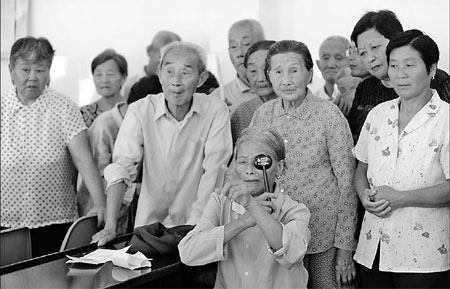Top News
Chinese fear aging process: Survey
By Chen Xin (China Daily)
Updated: 2010-09-25 08:37
 |
Large Medium Small |
Pension worries may have helped nation prepare for the future
BEIJING - People in China are among the most fearful of getting old, a new global survey suggests.
|
 Senior citizens get an eye checkup in Nanjing, Jiangsu province, on Sept 9. Wang Chengbing / For China Daily |
According to Bupa, a British healthcare organization, which asked 12,262 people in 12 countries about their attitudes toward aging, 28 percent of the Chinese polled said they feel depressed when they think about getting old.
And although 72 percent of all respondents aged 65 and over said they do not feel old, the survey conducted in June and July this year found more than half of those aged 45 to 54 in China already consider themselves to be elderly.
About 30 percent of Chinese respondents said they worry about who will look after them in later years, while 91 percent agreed the government of the world's most populous nation should improve care for the elderly.
However, because people in China think about their future earlier, research suggests the country could be one of the best prepared for addressing the aging problem.
About one third of Chinese respondents - more than double the global average - said they have put money aside for retirement, while 46 percent have taken out insurance, the poll showed.
Qiao Xiaochun, a population expert with Peking University, said the Chinese culture is one of the factors behind the fear.
He recalled an old Chinese maxim that says it is rare for someone to live past 70, adding: "Although the Chinese people enjoy extended longevity, many still stick to that old saying because of its cultural connotation."
Once a child starts work and moves away, Chinese parents feel they are getting old, said Qiao.
He also attributed Chinese people's early preparation for later life to the country's imperfect social security system.
"Many Western countries have sound welfare mechanisms, so residents don't worry about their pensions," he explained. "The Chinese government is making efforts to improve its pension system and to make it cover more people but many people still worry about how much money they will get when they retire."
Despite being one of the best prepared nations, three fifths of those surveyed in China expect their family to care for them when they can no longer do so themselves.
A Bupa-sponsored report by the London School of Economics, however, revealed that the "informal care network" (the traditional pattern of families looking after the elderly) is disintegrating.
This is due to a number of factors, said the report, including structural changes to the population, the increase of women in employment, the increase of one-person households and the rise in divorce rates.
"We urge everyone to start thinking about their future care, to start talking about it with their families and to start preparing for it," said Sneh Khemka, medical director of Bupa.
The first batch of Chinese couples with only one child are largely in their 50s or 60s because the country's family planning policy was adopted in the late 1970s.
Li Yinping, 55, a retired accountant in Beijing, said she thinks only people in their 70s can be called old. She said her pension is enough to support her in later years and that her only hope is that her son can visit regularly.
"I don't worry about my later years at all," said Li. "When I'm old, I can turn to a rest home. The local hospital can deliver the medicine I need with just a phone call."
Xiao Zhe, a 26-year-old computer engineer in Beijing, is an only child whose parents live in his hometown of Chongqing.
"I'm so busy with my work that I can't go back to visit them often," he said. "When they're not able to care for themselves, I will hire a nurse to look after them."
China will become the oldest society in the world by 2030, according to a recent report by a Beijing-based government think tank.
The United Nations also forecasts that people aged 60 and over will account for 28 percent of the country's total population by 2040.
Meanwhile, the Bupa survey revealed France is the most "young-at-heart" nation, with almost one third of French respondents believing people are only old when they pass 80.
China Daily